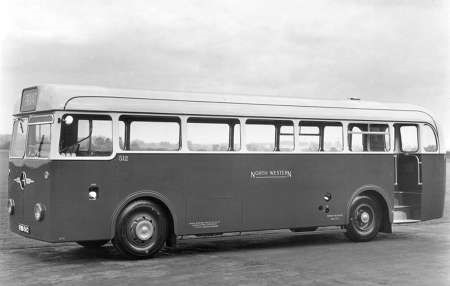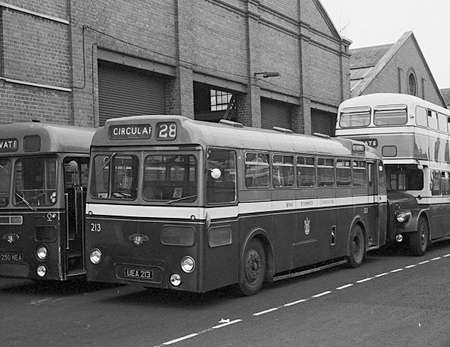West Bromwich (County Borough of) Transport Department
1958
Leyland Tiger Cub PSUC1/4
Mulliner B39R
This was one of three buses purchased by West Bromwich in 1958, which were unusual for two reasons. Firstly they represent a rare foray by Mulliner into the full size bus market; they were known for their bodies on smaller Bedfords, with substantial numbers delivered to the armed forces. Secondly, the provision of a rear entrance on a single deck vehicle was completely out of fashion by this stage, and I am unaware of any other examples on underfloor chassis types. One wonders what the reasoning behind this was, as well as the choice of Mulliner for the bodywork. I can only hazard a guess that none of the major bodybuilders were prepared to do so as they had by this stage all settled on a standard forward entrance design, whereas Mulliner were prepared to build to a bespoke design. Subsequent single deck purchases like 250 to its left were conventional; by this time Mulliner had ceased coachbuilding.
Photograph and Copy contributed by Alan Murray-Rust
15/02/21 – 06:07
Although not common rear entrances on underfloor engined single deckers did exist elsewhere. Accrington had them on East Lancs bodied Guy Arab LUF’s and Manchester on Leyland Royal Tigers bodied by Northern Counties. North Western had some Weymann bodied Atkinsons also. I think Southdown and Aldershot & District also had some but I would bow to our southern experts on that.
Philip Halstead
15/02/21 – 06:08
There were other examples of underfloor single deck service buses without front entrances.
Sheffield had a couple of Royal Tigers with open platform rear entrances and Doncaster (Regal IV) and SHMD (Atkinson) had centre door configurations.
I believe there were similar examples in Scotland which I am sure other contributors will be able to list.
Andrew Charles
15/02/21 – 06:09

North Western Road Car Company had rear entrance single deckers. Here is a picture of Atkinson Alpha, fleet number 512, (FDB 512) with a B44R Willowbrook body.
Stephen Howarth
15/02/21 – 15:19
What an unusual vehicle! Not just the body builder and entrance layout but the chassis as well. PSUC1/4 refers to a 7’6″ wide pneumocyclic gearbox version. I would think that is a pretty rare beast.
Ian Wild
15/02/21 – 15:20
East Yorkshire stuck with rear entrances into the underfloor-engined era, having Royal Tigers with Windover Kingsway coach bodies and Brush and Weymann bus bodies (the Weymann ones being later rebuilt as front entrance by Roe). Both East Yorkshire and Yorkshire Traction had Tiger Cubs with Willowbrook DP rear entrance bodies. Pontypridd UDC had some Arab LUFs with Roe bodies, and Edinburgh had one Leyland/MCW Olympic.
John Stringer
16/02/21 – 05:46
Here’s a photo of one of the Pontypridd Guy LUF/Roe vehicles. https://davidbeilby.zenfolio.com/
Chris Hebbron
16/02/21 – 05:48
Southdown did indeed have a batch of 10 Royal Tigers No’s 1500-1509 with East Lancs B40R bodies delivered in 1952. In 1953 these were followed by a further batch of 30 similar but centre entrance bodies again by East Lancs all of which were converted to front entrance for one man operation in the early sixties and very comfortable buses they were too.
David Lennard
16/02/21 – 05:49
Another unusual, even unique, feature of these Mulliner Tiger Cubs was that they had full bulkheads, confining the driver to his own full width cab. It can be made out in this photo – https://flic.kr/p/wXJyEo
Another website explains that rear entrances were specified because the spacing of town centre bus stops was based on rear entrance buses and it was felt that front entrance buses would lead to bus stop congestion. This view no longer prevailed when the next single deckers were acquired.
David Williamson
16/02/21 – 05:50
Thanks to all for the pointers to other rear entrance/underfloor vehicles. I suspect that it was a result of my not really becoming interested in buses until the mid 1960s that I was unaware that there were in fact quite so many, as I suspect that the majority had relatively short lives due to being unsuitable for OPO. Trawling BLOTW shows that the bulk of them date from between 1951 and 1954. The stand-out ones are Accrington (1956) and Pontypridd (1957), but as far as I can see, the West Brom ones were the last of the breed. It was the late date of construction for the layout that surprised me. Of particular interest are the two Royal Tigers for Sheffield, which are shown as B31R, which the discussion here //www.sct61.org.uk/sh222a shows is the result of the buses being designed for a significant number (26 to 31 depending on the source!). That page also drew my attention to another real oddity – the set of 8 Dennis lancet UF2 with unusual Davies bodies that Newport purchased in 1956/7. I should have remembered as I do have a picture of one of them!
Alan Murray-Rust
18/02/21 – 07:18
Referring back to the original post which suggests that this bus was a rare foray by Mulliner into the full size bus market.
In the same year as the three West Bromwich examples were produced Mulliner also built a pair of bodies on AEC Reliance chassis for Douglas Corporation, these followed on from five normal control Guys delivered the previous year.
Andrew Charles
18/02/21 – 07:18
An illustrated short history of Mulliners may be found on the Local Transport History Library site. Select General History, and on that Coach Builders page click on PDF-129-1. Mulliners is near the bottom.
Roger Cox
20/02/21 – 07:17
Municipal ordering begins with an invitation to tender. It’s doubtful if Mulliners would normally have responded to these. However, if Bedford chassis lists are anything to go by, it seems that their military work dried up in mid-1957, hence perhaps the turn towards mainstream PSV work illustrated by their bizarre full-size coach for the 1958 Commercial Motor Show. Even if their tender for this small batch of very non-standard Tiger Cubs (7’6″ wide as well as rear-entrance) was not the only one received, it could well have been the lowest. It seems that they gave up and sold out shortly after.
Peter Williamson

Leave a Reply